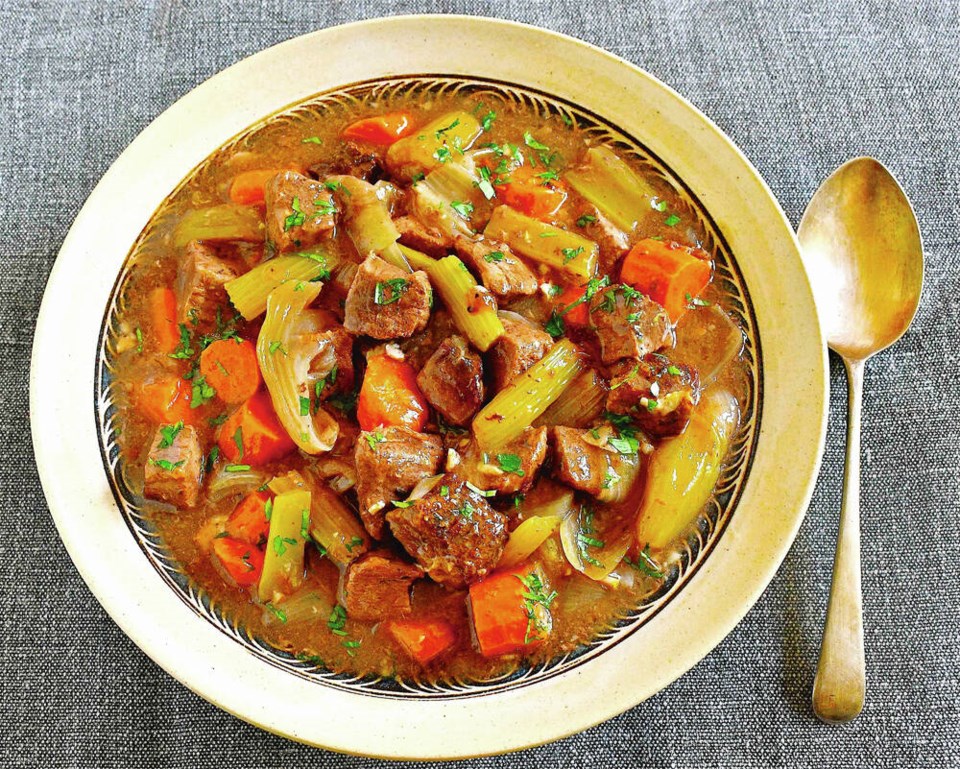Have you ever had dinner at a friend’s house and been served a dish so inviting you initially thought its preparation must have been complex? I have, and one of those occasions was when my wife and I were visiting our pals Dave and Dev.
On that night, Dev had something cooking in the oven and its aroma was amazing. When she served it, I was convinced it was some sort of French-style beef stew. A type of stew where she had to deeply sear each piece of beef before stewing it with the other carefully prepared ingredients.
When I asked Dev how she made it, though, I quickly learned I was very wrong. It wasn’t a French stew, although the person she acquired the recipe from, a man named Hughie, called it that.
“Hughie (Atwood) was my mother’s second partner. He was a beloved small town doctor (in Williams Lake) and a true character,” Dev said. “He was a brilliant thinker and had a photographic memory, but was famously impractical. He had a few well-practised recipes that he liked to cook.”
Dev says that when her mother, Dru, first saw the recipe, she told Hughie that wasn’t how you made stew, especially French stew. “She did eat her words, as the recipe is good and we always called it Hughie’s stew,” Dev said.
To make Hughie’s stew, in a large casserole or roasting pan, you simply combine cubes of raw stewing beef, carrots, celery, onion, garlic, stock (or tomato juice), red wine, quick cooking tapioca and seasonings. The stew is then covered and cooked in a 325 F oven three hours, at which point the meat will be quite tender and flavourful.
When you look at the stew before it goes in the oven, you might not think there’s enough liquid added to it. But as the meat slowly cooks it releases it juices and a saucy mixture forms around it. The tapioca added to the stew helps to thicken that liquid.
Dev was not sure if Hughie was the actual inventor of the recipe or how old it was. But I think, given the lack of succinct information for a few of the ingredients, it’s an older-style recipe, one that dates back to a time when home cooks could figure out what to do if that was the case.
For example, the recipe, which did not have some of the notes I’ve added below, simply says garlic, but does not say how much. Which gives you licence to add as much, or as a little, as you like. The recipe also gives you the option to add sliced potatoes to the stew later on in the cooking process, but does not note how many.
I didn’t add potatoes to it, because I like serving the stew with a side dish of mashed potatoes. In the past, I’ve also served it with rice pilaf. Any leftover stew will freeze well.
Hughie’s Stew
This is a hearty. mix-everything-in-one pan stew rich with tender meat and vegetables.
Preparation time: 20 minutes
Cooking time: three hours
Makes: four to six servings
2 lbs (about 900 grams) cubed stewing beef or cubed round steak
2 onions, each cut into eighths
2 stalks celery, cut into chunks
4 carrots, cut into chunks
1 cup beef broth or tomato juice
1 cup red wine
1/4 cup quick cooking tapioca (see Note 1)
2 tsp granulated sugar
2 tsp salt, or to taste (see Note 2)
• ground black pepper, to taste
1/2 tsp dried basil or thyme
• garlic (see Note 3)
• chopped fresh parsley, to taste
Preheat oven to 325 F. In a large casserole or roasting pan, add beef, onions, celery and carrots. Now add and mix in broth (or juice), wine, tapioca, sugar, salt, pepper, basil (or thyme) and garlic. Cover and bake three hours. Serve, topped with lots of chopped parsley.
Note 1: Quick cooking tapioca, such as Minit brand, is sold at most grocery stores, often in the baking supply aisle.
Note 2: If you are using salted broth, or you don’t wish to use a lot of salt, add salt, to taste, when making the stew.
Note 3: You can add as much, or as little, garlic as you like when making the stew. I mixed in two large cloves, halved and thinly sliced.
Note 4: If you like a thinner stew, add a bit more broth to it near the end of cooking.
Options: Potatoes, to taste, sliced a 1/4-inch, could be added and mixed into the stew an hour before it’s cooked.
Eric Akis is the author of eight cookbooks. His columns appear in the Life section Wednesday and Sunday.



